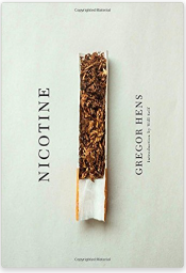 A book review of Gregor Hens’s Nicotine written for The Atlantic begins,
A book review of Gregor Hens’s Nicotine written for The Atlantic begins,
“Writers have long found rich fodder for their work in their leisure pursuits. John Updike, writing about golf in The New York Times in 1973, described the pastime as ‘a non-chemical hallucinogen’ that ‘breaks the human body into components so strangely elongated and so tenuously linked, yet with anxious little bunches of hyper-consciousness and undue effort bulging here and there, along with rotating blind patches and a sort of cartilaginous euphoria.’ Sketching out a particularly lucid paragraph about the act of preparing for a stroke, he confessed, ‘got me so excited I had to rush out into the yard and hit a few shots, even though it was pitch dark, and only the daffodils showed.’
“Updike’s experience of transcendence while playing golf—his sense of tapping in to a kind of acute concentration that alters perception—is echoed vividly in the German writer Gregor Hens’s new memoir of sorts, Nicotine,” reviewer Sophie Gilbert writes.
Nicotine, she says, “enters a kind of sub-genre of literary memoirs focused around a single practice or obsession, in which the object or activity enables the writer to achieve sharper focus, heightened consciousness, and creative fire. Like Haruki Murakami’s What I Talk About When I Talk About Running and Updike’s writing on golf, it illuminates the writerly quest for the elusive state the Hungarian psychologist Mihály Csíkszentmihályi named, simply, ‘flow.’ Smoking, Hens seems to believe, transformed him into a writer by expanding his sense of what was real and what was perceivable. It physically and irreparably altered the pathways in his brain. And it punctuated and constructed the order of his professional life.”
Read the full review.
